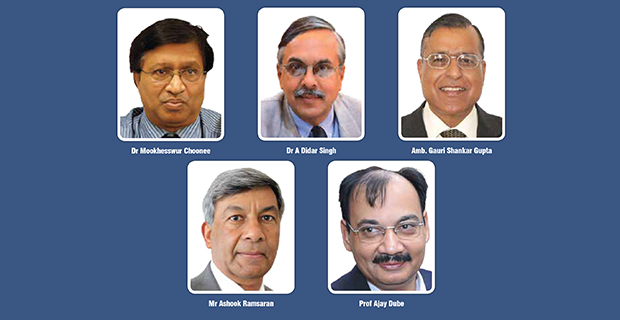ENGAGING INDIA’S YOUNG DIASPORA
The KIP is a “highly valued and successful initiative” of the government which “resonates with the youth”, points out Ashook Ramsaran, president of the New York-headquartered Indian Diaspora Council who’s of Indo-Guyanese origin. He explains, “The KIP is of high interest to the youth of the diaspora including those of non-Indian origin from smaller diaspora countries in the Caribbean. Irrespective of the native language of the participants, there is a continuing interest due to the active promotion by Indian High Commissioners.”
Dr A Didar Singh, former Secretary in the Ministry of Overseas Indian Affairs, is clear that the dividends from the programme are immense. It adds value to the participants’ knowledge as the government is able to connect them to the real India. Otherwise they don’t believe their parents when they talk about India. “This generation doesn’t believe their parents so it is necessary to keep the connection alive. That can come only through knowledge, hence the Know India Programme.”
Ambassador Gauri Shankar Gupta who served as India’s High Commissioner in Port of Spain says when he sent a group of youth from Trinidad and Tobago in 2015-16, who had only heard of India from their parents, it was an amazing experience for them. “Besides the fact that they were visiting the land of their ancestors, the participants were thrilled to see that Indians shared the same skin colour and features as they had a common DNA. They immediately developed an affiliation,” Gupta says.
The participants were happy to see the temples in India because they still follow the same culture and customs there. They have Ram Lilas in 35 different parts of their country in roman language. “After two generations normally the contact diminishes but the KIP re-energises the dormant energy and connects them with their roots,” Gupta asserts.
Dr. Mookhesswur Choonee, a former three-term minister in Mauritius who also served as his nation’s High Commissioner in India, was exposed to India’s rich heritage and culture early in life as he did his higher studies here. He strongly feels, “The youth across the world should be exposed to India, the oldest civilization. The world should knock on the door of India to learn about the richness of this country.
“The KIP is definitely helping the youth to discover India. The youth of today is attracted to Bollywood and its films and serials, but that’s not enough. India offers some of the best food in the world, its heritage, spirituality and culture is ancient. Its tourism is strong. Our youth should be groomed to discover, dive deeper and learn about India,” says Choonee whose forebears were from Bihar.
The KIP generates such an interest that many participants want to return to India. Tharisini Muniandy, a student from Malaysia, was in the 75th batch and is keen on visiting India again to explore more about its incredible diversity and to deepen her understanding of the country.
The same is the case with Anntish Potigadoo, an airport security officer from Mauritius. He is filled with admiration for India, its history and modernity, bustling markets, monuments, the serene spirituality of Bodhgaya, the cutting edge research and innovation of IIT Delhi, making him eager to return to India for a deeper knowledge.
Some others are keen to keep the connection with India going. “As the founder of an NPO in South Africa, ‘Project Simunye’, which imparts digital and financial skills to marginalised youth, my time in India has inspired me to continue my mission and to share India’s spirit with the world. I promise to use my heart to love, my voice to inspire, and my vision to carry the mission forward. I look forward to future projects with India and to seizing every opportunity to contribute and make a meaningful difference,” Moodley says.
All the participants relished Indian cuisine, from biryani to butter naan, butter chicken, dal makhani, kebabs, paneer, aloo chaat, gol gappa, samosas, etc. Meniesha Shreshta Tarawatie Raghunath, a doctor, and two others from Suriname, loved the food of Bihar. Since their ancestors largely came from Bihar and Uttar Pradesh, the food suited their palate.
But what left a lasting impression on all the participants is the huge strides India has made in various fields, particularly in the digital space. Keval Marimuthu, a communications officer from Trinidad and Tobago, was fascinated by the incredible initiatives being implemented by the government to drive investment and create a digital society. He strongly feels other countries can emulate India.
For the majority of the KIP participants this is a once-in-a-lifetime experience in a land from where their ancestors had emigrated. As Choonee says, this experience will become deeply transformative when Indian missions, over the years, have regular follow-ups with every batch of participants. That, no doubt, will be inspiring for generations to come.











Comments.